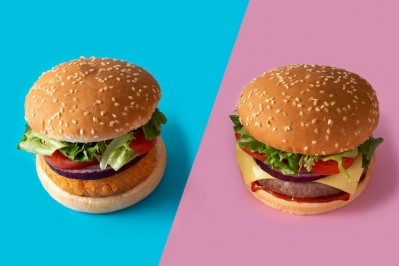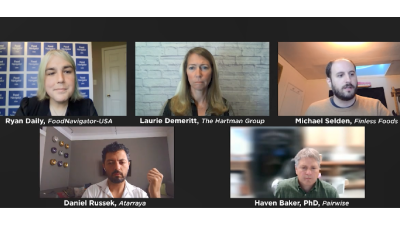Future Ocean Foods “tells a new story for alternative seafood”

With its recent launch in November, alternative seafood association, Future Ocean Foods (FOF), includes 36 companies in 14 countries from start-ups to established companies with products in market and across plant-based, fermentation and cultivated food and technology sectors.
Bronfman also emphasized that 40% of FOF’s founders are female, which “is in a much larger proportion than we’ve seen in alternative meat or alternative dairy …there are so many women around the world leading the way.”
Creating a new language around alternative seafood
As the organization ramps up its efforts to educate consumers and supply chain stakeholders on the benefits of alternative seafood, Bronfman said that the term “alternative” needs a refresh.
“We all strongly feel that we need to tell a new story for alternative seafood,” including reworking the term “alternative,” which Bronfman cites as a stigmatized term for consumers who feel alternative foods are fake or made with unnatural ingredients.
“So even the word ‘alternative,’ whether alternative proteins or alternative seafood, is really problematic. There’s not a lot consensus, there’s not broad understanding. So we all feel that at Future Ocean Foods, it’s up to us to define and create a new language with which we can talk about what we’ll call alternative seafood,” she emphasized.
She added, “A large part of what we’re doing is creating something that’s hugely nutritious, delicious, sustainable and also happens to be ethical and equitable.”
Focus on omega-3 production from algae
While consumers seek seafood for a healthy, protein-rich diet, Bronfman noted that the same omega-3s in fish can be derived from algae, which is a sustainable food source according to a 2022 Frontiers study.
“When we think about fish [containing] omegas, that’s typically why we consider fish to be healthy and unique. But fish eat algae to get their omega and humans can eat algae to get omegas. So there’s also a really big part of ‘let’s go back to basics,’” she said.
FOF’s work with omega-3 production is leveraged through its partnership with The Global Organization for EPA and DHA Omega-3s (GOED), which represents the worldwide eicosapentaenoic acid (EPA) and docosahexaenoic acid (DHA) industry; as well as a number of FOF members that produce fish-free omega-3 derived from algae: Mara Renewables, infusd nutrition and Algarithm.
“When we talk about omegas, we’re typically looking at the EPA/DHA combination that’s so powerful for human health, which can absolutely come from algae. Just by virtue of having folks that have this expertise and product in the omega space makes it really valuable for all of our members that are creating products, because now we have a direct relationship and line of communication with omega providers,” Bronfman elaborated.
Expanding education and partnerships may improve access to funding within the category
While funding in the alternative protein space has largely gone to alternative meat, Bronfman says she is hopeful that despite the smaller size of the seafood market, investors will find a “huge opportunity globally” to invest in the sector. Along with expanding education and awareness of the health and sustainability opportunities for consumers, FOF intends to reach investors on a similar level.
“Because the … alternative seafood [market] is relatively new, it’s not on the radar of as many investors as perhaps meat was over the last decade. Not only do I think that will change, I am committed to accelerating that change through this association for investors and that’s a big piece of our education and awareness component … There is a lot more knowledge of what this category can do,” she added.
While aquaculture continues growing as a possible solution to overfishing in open waters, Bronfman argued that these methods can also risk exposure to pollutants and antibiotics, and impact workers if social compliances like fair and equitable labor are overlooked.
In the US, Aquaculture Stewardship Council (ASC) is ramping up its recognition by building its certification program directly with seafood farmers, distributors and suppliers as a way to standardize sustainable seafood across the supply chain; while the Marine Stewardship Council (MSC) certifies the sustainability of wild caught seafood.
Bronfman added that FOF intends to collaborate with traditional seafood, “whether that’s companies, organizations, trade associations.
“We never want to reinvent the wheel. Our whole spirit is collaborative. We want to advance this category. Advancing this category is a benefit to humans. It’s a benefit to the environment. It’s a win-win and that’s our attitude approaching any and all partnerships,” she added.


















